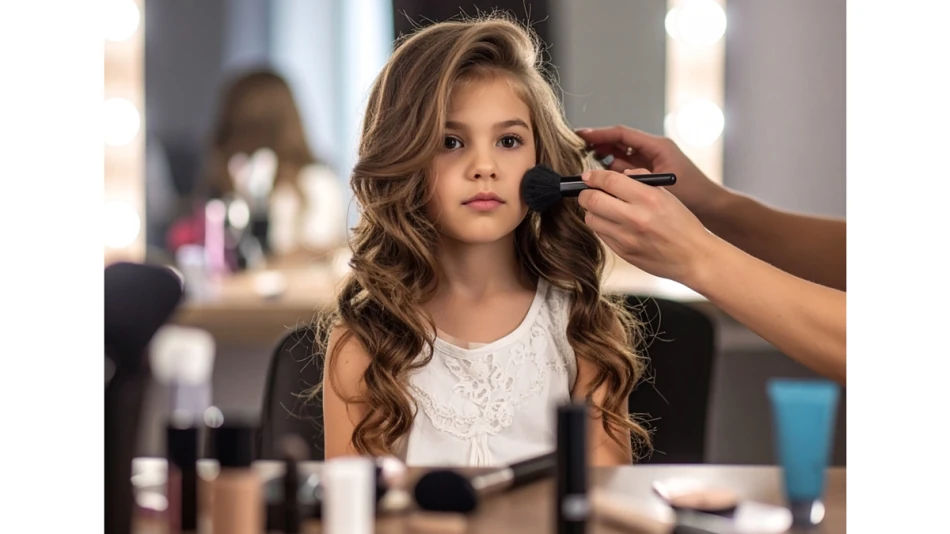
Salon Services for Minors: Serious Health Risks and Calls for Ban Under 18
Beauty Salons Putting Children at Risk: UAE Doctors Sound Alarm Over Dangerous Cosmetic Trends
Medical professionals in the UAE are raising urgent concerns about a growing trend of mothers taking their children to beauty salons for chemical treatments including hair dyeing, straightening, and skin tanning. Doctors warn these practices pose severe long-term health risks to children's immune systems and natural development, calling for immediate regulatory intervention to protect minors under 18 from potentially dangerous cosmetic procedures.
A Troubling New Business Model
Beauty salons across the UAE have begun capitalizing on parental demand by creating dedicated children's sections offering adult-level cosmetic services without proper age-appropriate licensing. Some establishments have transformed birthday parties into mini-spa experiences for young children, normalizing chemical treatments that were once reserved for adults.
This trend reflects broader global patterns seen in markets like South Korea and parts of the United States, where beauty standards increasingly target younger demographics. However, unlike regulated markets that have established age restrictions for certain treatments, the UAE appears to be catching up with oversight measures.
Medical Evidence Points to Serious Health Risks
Chemical Burns and Permanent Damage
Dr. Anwar Al Hammadi, a dermatology specialist, reports documented cases of children suffering chemical burns on their scalps, permanent hair loss, and severe skin inflammation from age-inappropriate salon treatments. These aren't isolated incidents but part of a pattern he's observed through clinical practice.
The damage often stems from products containing formaldehyde, ammonia, and parabens—chemicals that adult bodies struggle to process safely, let alone developing immune systems in children.
Nine Critical Health Threats Identified
Medical professionals have catalogued specific risks including contact allergies, eczema, respiratory irritation from chemical inhalation, increased skin cancer risk from tanning devices, liver and kidney toxicity, hormonal disruption, and transmission of bacterial, fungal, and viral infections due to children's weaker immune defenses.
Dr. Hanan Al Hana, a general practitioner, emphasizes that children's bodies lack the biological mechanisms to effectively eliminate these toxins, potentially causing complications that may not manifest until years later.
Psychological Damage Beyond Physical Harm
Child psychologist Hessa Al Raees warns that early exposure to cosmetic treatments creates dangerous psychological dependencies on external validation. Children who regularly visit salons begin defining their self-worth through appearance rather than developing internal confidence and character.
This pattern mirrors concerning trends observed in social media-saturated societies where young people increasingly struggle with body image issues and self-esteem problems linked to unrealistic beauty standards.
Regulatory Gaps Create Dangerous Market Conditions
The current regulatory framework appears insufficient to address this emerging risk. Salons operate children's services without specialized licenses or age-appropriate safety protocols, creating a legal gray area that prioritizes profit over child welfare.
This contrasts sharply with countries like Australia and parts of Europe, where strict age limits exist for chemical hair treatments and cosmetic procedures involving minors require parental consent and medical oversight.
Economic Incentives Drive Risky Practices
The children's beauty market represents a lucrative expansion opportunity for salons facing increased competition. Birthday party packages and family beauty experiences generate higher revenue per customer while building brand loyalty from an early age.
However, this business model externalizes health costs onto families and the healthcare system while privatizing profits—a dynamic that typically requires regulatory correction to protect vulnerable populations.
Path Forward: Regulation and Education
Medical professionals are calling for comprehensive regulatory reform including strict age limits for chemical treatments, mandatory specialized licensing for child-focused services, enhanced sanitation requirements, and public awareness campaigns targeting parents.
The proposed 18-year age limit aligns with international best practices recognizing that minors cannot provide informed consent for treatments with potential long-term consequences. Such regulations would position the UAE as a regional leader in child protection standards.
The stakes extend beyond individual health outcomes. How the UAE addresses this issue will signal whether its healthcare system can proactively protect children from emerging commercial threats, or whether regulation will lag behind market forces that prioritize profit over pediatric safety.
Most Viewed News

 Sara Khaled
Sara Khaled






